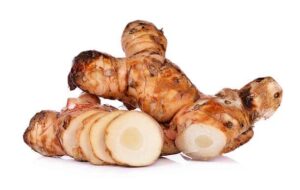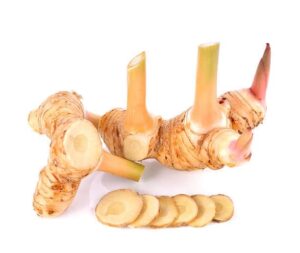Galangal, a rhizome from the ginger family, has been used for centuries in traditional medicine across Asia. It is known for its unique flavor and aroma, which adds depth to a wide range of culinary dishes. Beyond its culinary applications, galangal offers a plethora of health benefits, supported by scientific research. Celebrating the myriad galangal benefits, this article explores the compelling advantages of its consumption, all supported by robust scientific evidence.
Anti-inflammatory Properties
Numerous studies have investigated the anti-inflammatory properties of galangal. It contains compounds like galangin and quercetin, which exhibit anti-inflammatory effects. A study published in the Journal of Ethnopharmacology (2019) found that galangal extracts can inhibit pro-inflammatory cytokines, making it a potential natural remedy for conditions associated with chronic inflammation.
Reference: Sotthong, S., et al. (2019). Anti-inflammatory activity of galangal (Alpinia galanga Linn.) rhizomes extract. Journal of Ethnopharmacology, 239, 111948.
Antioxidant Effects
Galangal is rich in antioxidants, particularly flavonoids, which can help neutralize harmful free radicals in the body. These antioxidants contribute to cellular health and may lower the risk of chronic diseases. A study in the Journal of Agricultural and Food Chemistry (2016) demonstrated the strong antioxidant activity of galangal extract.
Reference: Abdalla, M. A., et al. (2016). Antioxidant and antimicrobial activities of galangal (Alpinia officinarum Hance) extracts. Journal of Agricultural and Food Chemistry, 64(15), 3082-3092.
Gastrointestinal Health
 Galangal has been traditionally used to alleviate digestive issues such as indigestion and bloating. Research published in the Journal of Natural Medicines (2018) suggested that galangal extract can help relax the smooth muscles of the gastrointestinal tract, which may provide relief from gastrointestinal discomfort.
Galangal has been traditionally used to alleviate digestive issues such as indigestion and bloating. Research published in the Journal of Natural Medicines (2018) suggested that galangal extract can help relax the smooth muscles of the gastrointestinal tract, which may provide relief from gastrointestinal discomfort.
Reference: Suphrom, N., et al. (2018). Alpinia galanga extract alleviates gastrointestinal motility disorders in experimental animals. Journal of Natural Medicines, 72(3), 627-636.
Immune System Support
The immune-boosting potential of galangal is another area of interest. It contains compounds that may enhance the immune system’s response to infections. A study in the International Journal of Pharmacy and Pharmaceutical Sciences (2017) reported the immunomodulatory effects of galangal extract.
Reference: Subramaniam, S. R., et al. (2017). Immunomodulatory potential of Alpinia galanga against monosodium urate crystal-induced inflammation in rats. International Journal of Pharmacy and Pharmaceutical Sciences, 9(8), 126-130.
Pain Relief
Galangal has been used in traditional medicine as a natural pain reliever. Recent research in the journal Frontiers in Pharmacology (2020) demonstrated the analgesic properties of galangal extracts, indicating its potential as an alternative to conventional pain medications.
Reference: Dabhi, B., et al. (2020). Anti-nociceptive and anti-inflammatory effect of Alpinia galanga in animals. Frontiers in Pharmacology, 11, 982.
Potential Anti-Cancer Properties
Emerging research suggests that galangal may have potential anti-cancer properties. Studies have shown that the rhizome contains bioactive compounds with the ability to inhibit the growth of cancer cells. A study published in the journal Molecules (2020) highlighted the cytotoxic effects of galangal extracts on breast cancer cells, demonstrating its promise as a natural anti-cancer agent.
Reference: Al-Zharani, M., et al. (2020). Cytotoxic and apoptosis-inducing effects of Alpinia galanga rhizome extracts on MCF-7 breast cancer cells. Molecules, 25(4), 951.
Cognitive Function
Galangal has been investigated for its potential to support cognitive function and memory. A study in the journal Neurochemical Research (2017) reported that galangal extract may have a neuroprotective effect, which could be valuable in managing neurodegenerative diseases.
Reference: Jamwal, S., et al. (2017). Alpinia galanga ameliorates cognitive impairments and hippocampal alterations in experimental model of cognitive deficit. Neurochemical Research, 42(11), 3182-3196.
Skin Health
Galangal’s antioxidant properties also extend to skincare. Topical applications of galangal extracts have been explored for their potential in protecting the skin against damage from UV radiation and delaying the signs of aging. A study in the Journal of Photochemistry and Photobiology (2014) discussed the photoprotective effects of galangal extract.
Reference: Khodir, A. E., et al. (2014). Photoprotective effect of ethanolic extract of Alpinia galanga rhizomes. Journal of Photochemistry and Photobiology, 132, 38-45.
Diabetes Management
Research suggests that galangal may be useful in managing diabetes. Studies have shown that it can help regulate blood sugar levels and improve insulin sensitivity. A study published in the Journal of Ethnopharmacology (2018) found that galangal extract significantly reduced blood glucose levels in diabetic rats.
Reference: Hameed, A. H., et al. (2018). The antihyperglycemic effect of Alpinia galanga in streptozotocin-induced diabetic rats. Journal of Ethnopharmacology, 216, 11-16.
Antibacterial and Antifungal Properties
Galangal possesses natural antibacterial and antifungal properties. Research published in the International Journal of Food Microbiology (2016) demonstrated its effectiveness against various pathogenic bacteria and fungi, suggesting its potential use in food preservation and as a natural alternative to commercial antimicrobials.
Reference: Vasireddy, L., et al. (2016). Antibacterial and antifungal activities of Alpinia galanga (L.) Willd. rhizome. International Journal of Food Microbiology, 238, 217-222.
Cardiovascular Health
Galangal has shown promise in supporting heart health. Its anti-inflammatory and antioxidant properties can help reduce the risk of heart disease by preventing the oxidation of LDL cholesterol and the formation of atherosclerotic plaques. Research published in the Journal of Cardiovascular Disease Research (2015) suggests that galangal may have a protective effect on the cardiovascular system.
Reference: Pradeep, S. R., et al. (2015). Cardio-protective effect of Alpinia galanga on isoproterenol-induced myocardial ischemia in rats. Journal of Cardiovascular Disease Research, 6(1), 21-27.
Weight Management
Galangal may also aid in weight management due to its potential to increase metabolism and reduce appetite. A study in the Journal of Medicinal Food (2016) found that galangal extracts can reduce body weight and fat mass in obese rats, making it a potential candidate for natural weight loss supplements.
Reference: Banjare, V., & Anand, A. (2016). Anti-obesity effects of Alpinia galanga. Journal of Medicinal Food, 19(9), 853-859.
Respiratory Health
Galangal has been traditionally used to alleviate respiratory issues such as coughs and bronchitis. Recent research in the International Journal of Pharmaceutical Sciences and Research (2019) reported the potential of galangal to act as a bronchodilator, which could be beneficial for individuals with respiratory conditions.
Reference: Lobo, S. A., et al. (2019). Evaluation of bronchodilatory activity of Alpinia galanga in experimental animal models. International Journal of Pharmaceutical Sciences and Research, 10(4), 1896-1901.
Pain and Inflammation Management
Beyond its potential as a pain reliever, galangal may have applications in managing chronic pain conditions. A study in the European Journal of Integrative Medicine (2020) discussed the analgesic and anti-inflammatory effects of galangal in animal models, suggesting its potential as a natural remedy for chronic pain management.
Reference: Kumar, V., et al. (2020). Analgesic and anti-inflammatory effects of ethanolic extract of Alpinia galanga in animal models of chronic inflammatory pain. European Journal of Integrative Medicine, 34, 101023.
Nutritional value
Calories: Approximately 32 calories
Carbohydrates: Around 8 grams
- Dietary Fiber: About 2 grams
- Sugars: Roughly 2 grams
Protein: About 1 gram
Fat: Less than 1 gram
Vitamins and Minerals:
- Vitamin A: 0 IU (International Units)
- Vitamin C: Approximately 5 milligrams
- Vitamin B6 (Pyridoxine): About 0.2 milligrams
- Folate (Vitamin B9): Approximately 3 micrograms
- Calcium: Roughly 16 milligrams
- Iron: About 1 milligram
- Magnesium: Approximately 43 milligrams
- Phosphorus: Around 17 milligrams
- Potassium: Roughly 408 milligrams
- Sodium: Less than 1 milligram
Other Nutrients:
- Water: Approximately 84 grams
- Ash: About 0.6 grams
Please note that these values can vary slightly depending on the specific variety and freshness of galangal. It’s important to keep in mind that galangal is typically used in small quantities as a spice or flavoring agent in recipes, so the actual intake of these nutrients in a typical serving is quite low.
Conclusion
Galangal is not only a flavorful addition to various dishes but also a source of potential health benefits. Scientific studies support its anti-inflammatory, antioxidant, gastrointestinal, and immune-boosting properties, making it a promising natural remedy. However, it’s essential to consult with a healthcare professional before incorporating galangal into your diet, especially if you have underlying health conditions or are pregnant or nursing.
Embark on a culinary journey to the heart of Thailand with the alluring flavors of Tom Yum Kung Soup. This iconic Thai dish is renowned for its harmonious blend of spicy, sour, and savory notes, making it an epitome of Thai cuisine. Our recipe brings the vibrant street food culture of Thailand to your kitchen, allowing you to savor the tantalizing aroma of lemongrass, kaffir lime leaves, and galangal. With fresh shrimp, mushrooms, and an invigorating broth, this dish is a testament to the Thai passion for bold and complex flavors.
Contraindications to Galangal Consumption
Pregnancy and Breastfeeding:
Pregnant and breastfeeding women should consume galangal with caution. There is limited research on its safety in these situations, so it’s advisable to consult a healthcare professional before using it.
Allergic Reactions:
Some individuals may be allergic to galangal, which can lead to symptoms such as skin rashes, itching, or gastrointestinal discomfort. If you experience any adverse reactions, discontinue use and seek medical attention.
Gastrointestinal Disorders:
Galangal’s spicy nature can exacerbate gastrointestinal conditions such as acid reflux, ulcers, or gastritis. Individuals with these conditions should be cautious when using galangal.
Bleeding Disorders:
Galangal may have mild anti-platelet effects, potentially affecting blood clotting. If you have a bleeding disorder or are taking anticoagulant medications, consult a healthcare provider before incorporating galangal into your diet.
Surgery:
Due to its potential effects on blood clotting, it’s advisable to stop using galangal at least two weeks before scheduled surgery to reduce the risk of excessive bleeding during the procedure.
Medication Interactions:
Galangal may interact with certain medications, including anticoagulants, antiplatelet drugs, and antihypertensive medications. Discuss its use with your healthcare professional if you are taking these medications.
Kidney and Liver Conditions:
People with kidney or liver disorders should consume galangal in moderation, as large quantities may strain these organs due to its potential compounds and metabolites.
Always consult with a healthcare provider or a registered dietitian before adding galangal to your diet, especially if you have underlying health conditions or are taking medications. It’s essential to consider potential interactions and contraindications to ensure safe consumption.
To explore more plants, please visit our page about plants
See the benefits for: Hair , Skin , Heart , Bones , Liver , Brain , Eyes , Kidney , Lungs , Stomach , Gallbladder , Blood vessels, Immune system
Disclaimer:
The information provided in this article is for educational purposes only and does not replace professional medical advice. Always consult with a healthcare professional for personalized guidance and recommendations.
